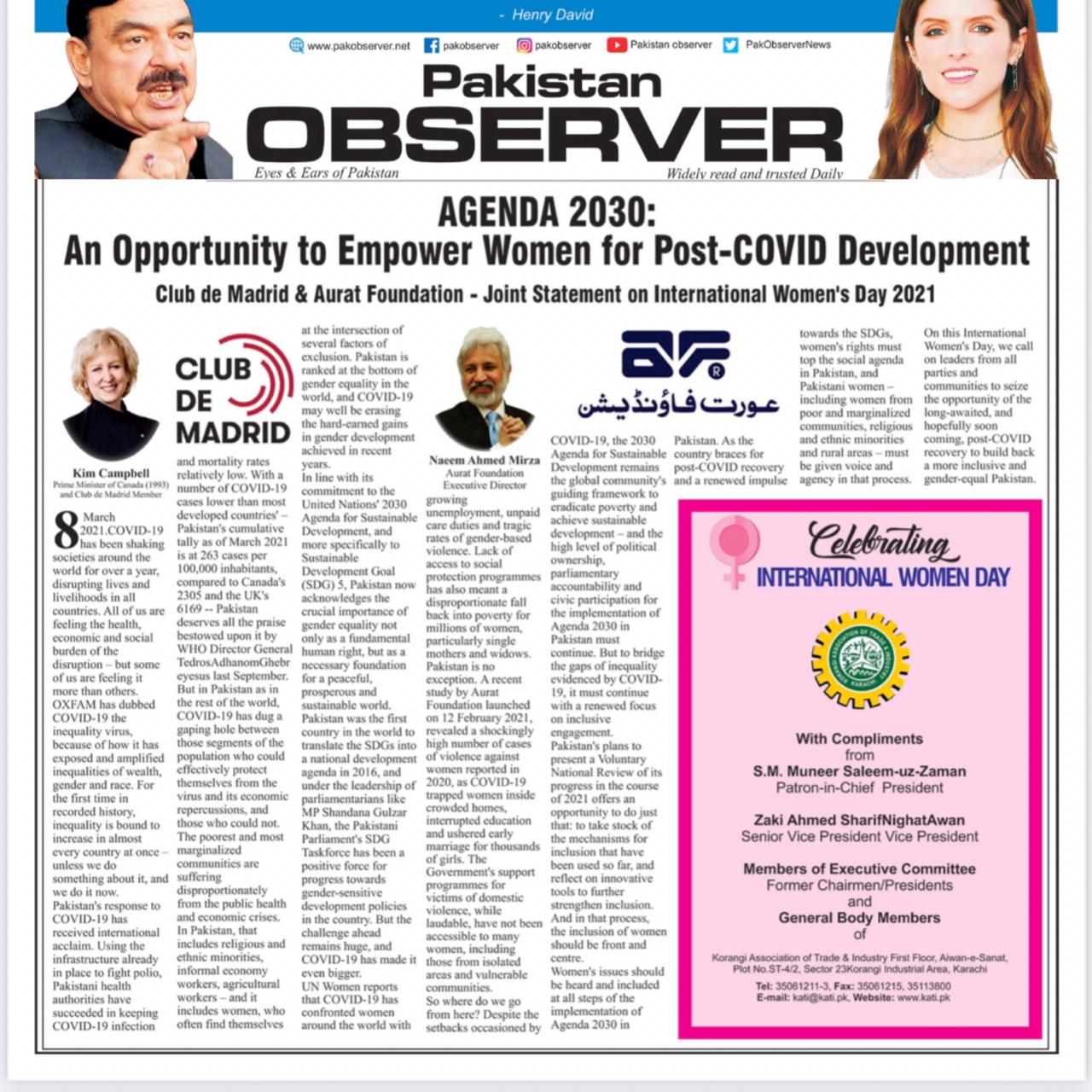COVID-19 has been shaking societies around the world for over a year, disrupting lives and livelihoods in all countries. All of us are feeling the health, economic and social burden of the disruption – but some of us are feeling it more than others. OXFAM has dubbed COVID-19 the inequality virus, because of how it has exposed and amplified inequalities of wealth, gender and race. For the first time in recorded history, inequality is bound to increase in almost every country at once – unless we do something about it, and we do it now.
Pakistan’s response to COVID-19 has received international acclaim. Using the infrastructure already in place to fight polio, Pakistani health authorities have succeeded in keeping COVID-19 infection and mortality rates relatively low. With a number of COVID-19 cases lower than most developed countries’ – Pakistan’s cumulative tally as of March 2021 is at 263 cases per 100,000 inhabitants, compared to Canada’s 2305 and the UK’s 6169 — Pakistan deserves all the praise bestowed upon it by WHO Director General Tedros Adhanom Ghebreyesus last September. But in Pakistan as in the rest of the world, COVID-19 has dug a gaping hole between those segments of the population who could effectively protect themselves from the virus and its economic repercussions, and those who could not.
The poorest and most marginalized communities are suffering disproportionately from the public health and economic crises. In Pakistan, that includes religious and ethnic minorities, informal economy workers, agricultural workers – and it includes women, who often find themselves at the intersection of several factors of exclusion. Pakistan is ranked at the bottom of gender equality in the world, and COVID-19 may well be erasing the hard-earned gains in gender development achieved in recent years.
In line with its commitment to the United Nations’ 2030 Agenda for Sustainable Development, and more specifically to Sustainable Development Goal (SDG) 5, Pakistan now acknowledges the crucial importance of gender equality not only as a fundamental human right, but as a necessary foundation for a peaceful, prosperous and sustainable world. Pakistan was the first country in the world to translate the SDGs into a national development agenda in 2016, and under the leadership of parliamentarians like MP Shandana Gulzar Khan, the Pakistani Parliament’s SDG Taskforce has been a positive force for progress towards gender-sensitive development policies in the country. But the challenge ahead remains huge, and COVID-19 has made it even bigger.
UN Women reports that COVID-19 has confronted women around the world with growing unemployment, unpaid care duties and tragic rates of gender-based violence. Lack of access to social protection programmes has also meant a disproportionate fall back into poverty for millions of women, particularly single mothers and widows. Pakistan is no exception. A recent study by Aurat Foundation launched on 12 February 2021, revealed a shockingly high number of cases of violence against women reported in 2020, as COVID-19 trapped women inside crowded homes, interrupted education and ushered early marriage for thousands of girls. The Government’s support programmes for victims of domestic violence, while laudable, have not been accessible to many women, including those from isolated areas and vulnerable communities.
So where do we go from here? Despite the setbacks occasioned by COVID-19, the 2030 Agenda for Sustainable Development remains the global community’s guiding framework to eradicate poverty and achieve sustainable development – and the high level of political ownership, parliamentary accountability and civic participation for the implementation of Agenda 2030 in Pakistan must continue. But to bridge the gaps of inequality evidenced by COVID-19, it must continue with a renewed focus on inclusive engagement.
Pakistan’s plans to present a Voluntary National Review of its progress in the course of 2021 offers an opportunity to do just that: to take stock of the mechanisms for inclusion that have been used so far, and reflect on innovative tools to further strengthen inclusion. And in that process, the inclusion of women should be front and centre.
Women’s issues should be heard and included at all steps of the implementation of Agenda 2030 in Pakistan. As the country braces for post-COVID recovery and a renewed impulse towards the SDGs, women’s rights must top the social agenda in Pakistan, and Pakistani women – including women from poor and marginalized communities, religious and ethnic minorities and rural areas – must be given voice and agency in that process. On this International Women’s Day, we call on leaders from all parties and communities to seize the opportunity of the long-awaited, and hopefully soon coming, post-COVID recovery to build back a more inclusive and gender-equal Pakistan.
Kim Campbell
Prime Minister of Canada (1993)
Club de Madrid Member
Naeem Ahmed Mirza
Aurat Foundation Executive Director
This op-ed was published on 8 March 20201 at the Pakistan Observer

